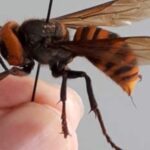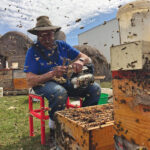
Tag Archives Bees

Editorial: Labels and legalities

Smoking out Canadian honey fraud
The CFIA found less adulterated honey in 2019-20, although beekeepers say those numbers only encompass a part of their market reality

Two more ‘murder hornets’ turn up on B.C. mainland
One nest found last month in neighbouring U.S. town

Manitoba beekeeper receives recognition for protecting pollinators
Ian Steppler uses a thriving YouTube channel and speaking engagements to share his philosophy

Province, Manitoba Beekeepers announce knowledge transfer program
Applied research and technical support will help beekeepers struggling to keep up with changing agricultural landscape

Queens, drones and bees that fly backwards
Three beekeeping experts explain honeybee breeding in Manitoba

More ‘murder hornets’ found in B.C., Washington
Findings suggest some were able to overwinter

Disappearing natural habitat threatens bees’ diet
Maintaining pockets of nature among cropland allows bees to thrive on a balanced diet, says beekeeper Ian Steppler

Beekeepers see shorter season

High-tech hives
Beekeepers might get constant hive conditions at their fingertips once a student project out of Assiniboine Community College is fully developed


